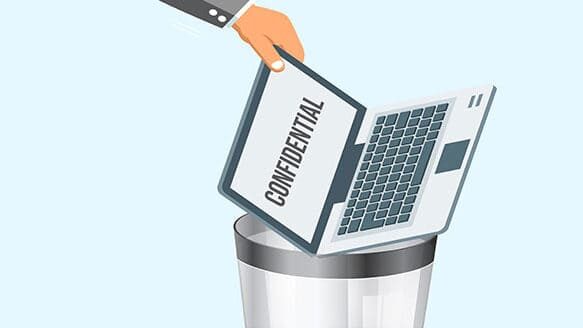Unfortunately, hitting delete on your files doesn’t actually make them disappear. Even if you restore the computer to factory settings or just reinstall Windows, it's still possible to get to your old data. Remember the VHS tapes? You could record something new over the old footage but you'd definitely need to do it over the whole tape. Same applies to hard drives.
Most businesses are unaware that specialized data cleanup is necessary, others think calling someone to collect the computers will cover all the bases. A 2016 experiment proved just how dangerous the situation can be when they bought 200 used hard drives and found 67% held unwiped, unencrypted sensitive data, including sales projection spreadsheets, CRM records, and product inventories. Frighteningly, they didn’t need any special hacking skills to get this data, it was all right there and helpfully labelled. It’s also not surprising that with simple data recovery tools, people have also been able to access British NHS medical records and missile data, all waiting patiently on a discarded hard drive.
Why hitting delete doesn’t help
Data on a hard drive works like a book with an index page. Every time data is written, it pops a quick entry into the index so when you need it again, it knows where to look. The index is used for files you create as well as system files you can’t even see. Sensible, right? Except if you delete a file it’s more like changing the index to say nothing is on page 10 and you can write something else there when you’re ready. But if you manually flip to page 10, you’ll find the information is still there - the file still exists until it’s been written over - it’s the index reference that got deleted.
Wiping data before disposal
There are software tools you can get to do it yourself, as well as dedicated security firms, but your best option is to choose an IT business you know and trust. With that in mind, a methodical approach is required to ensure not a single drive is left untreated. You don’t want to leave data behind, or even clues that a motivated person could extrapolate any private information from. The approach might include using checklists to maintain security, or dedicated processes to guide each step in decommissioning. Careful records should also be kept, including who signs off on completion of the retirement, and where the computers are sent afterwards. A proper inventory and auditing process may slow the rollout of the new computers slightly, but it’s always better than having your old data come back to haunt you.
We can migrate any needed data, back up the information to your external drive, then wipe or destroy the hard drives for you. We can assess the age of your old computers and either dispose of them for you or refurbish the computers by replacing a few parts to make them work almost as good as new. Less of your old stuff will end up in a landfill and you'll sleep better knowing that nobody else has your data.







